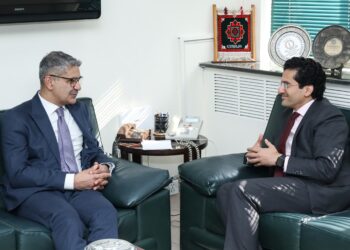ISLAMABAD: Industrial consumers and Power Division on Thursday joined hands in snubbing the ” unfair ” action of Oil and Gas Regulatory Authority (OGRA) for the recovery of RLNG arrears from 2015.
At a public hearing convened by the National Electric Power Regulatory Authority (NEPRA) on Thursday, the Power Division, private sector, and even Karachi Electric (KE) lined up against the Oil and Gas Regulatory Authority (OGRA) over RLNG arrears dating back to 2015. If approved, these arrears could raise electricity tariffs by Rs 2–4 per unit — with industry warning that the additional cost would inevitably be passed on to consumers.
The hearing, which reviewed the uniform Fuel Charges Adjustment (FCA) for July 2025, was told that CPPA-G had sought a negative adjustment of Rs 1.69 per unit. With the existing FCA of Rs 0.78 per unit being replaced, refunds worth Rs 12.5 billion are expected at the rate of Rs 0.91 per unit. Yet, concerns were raised over why Rs 10 billion in negative FCA for May and June has been withheld from KE’s consumers.
Industry leaders argued that OGRA’s retrospective recovery of RLNG costs — without public hearings — violated legal principles and further undermined tariff predictability. Textile exporter Aamir Sheikh cautioned that “no one knows the actual RLNG rate,” making it impossible for industry to plan, thereby threatening jobs and export competitiveness. He also criticized recent hikes in domestic gas tariffs, calling them an additional blow to struggling businesses and households.
CPPA-G’s CEO acknowledged that even his organization opposed the retrospective recovery of RLNG differences, describing industry objections as “fair.” He admitted that OGRA had recently declared earlier RLNG bills “provisional” — a classification never used before.
A representative of NTDC informed the Authority about the reasons behind reduced wind generation and shutdowns of other power plants. He said electricity supply to KE had been increased from 1,600 MW to 2,000 MW after completion of technical work, which allowed for greater wind energy draw. He clarified that wind is curtailed only when RLNG generation faces issues. He further explained the reasons of forced outages and planned outages of different power plants in July 2025.
On a question regarding KE’s performance during recent heavy rains, Member (Technical) praised CEO Moonis Alvi for restoring power grids in the shortest possible time, adding that he had personally seen Mr. Alvi on KE trucks supervising restoration work in Karachi.
During the hearing, NEPRA’s role in ensuring fair decisions was also appreciated by industry representatives and media, particularly when compared with other regulatory bodies, including OGRA.
Industrialist Arif Bilwani noted that rules framed in 2005 had remained unchanged for 20 years, despite allowing Discos and KE to make capital investments worth hundreds of billions of rupees in transmission and distribution upgrades. “Why should 20-year-old rules and benchmarks continue unchanged instead of being made more stringent with time?” he asked, stressing that consumers still face poor-quality power.
He said many captive power units remain reluctant to shift to the grid due to such issues. He further questioned why industries are forced to install costly 132 kV grids for loads of 20–50 MW, when 33 kV or 66 kV grids could easily suffice. “This requirement not only costs enormous sums but also consumes much more space. It is an unnecessary burden. Discos themselves maintain dozens of 66 kV grids, yet deny the same option to consumers,” he added.
For Karachi consumers, the issue of withheld FCA adjustments triggered sharp debate. Industrial consumer Rehan Jawed argued that the Power Division cannot impose uniform FCA or block KE’s refunds without written Cabinet approval. “These decisions cannot be applied retrospectively,” he insisted. KE, however, supported a uniform FCA, saying it would eventually benefit its consumers.
The Karachi Chamber of Commerce and Industry (KCCI) pointed to broader governance failures, citing the Auditor General’s report showing Rs 481 billion unrecovered from Discos in 2023–24, alongside Rs 4.8 trillion in financial and operational irregularities in 2024–25.
Despite the differing narratives, one reality remained constant throughout the hearing: regulatory disputes and sectoral inefficiencies are creating a financial overhang that consumers — both households and businesses — will ultimately have to bear.
Ends















